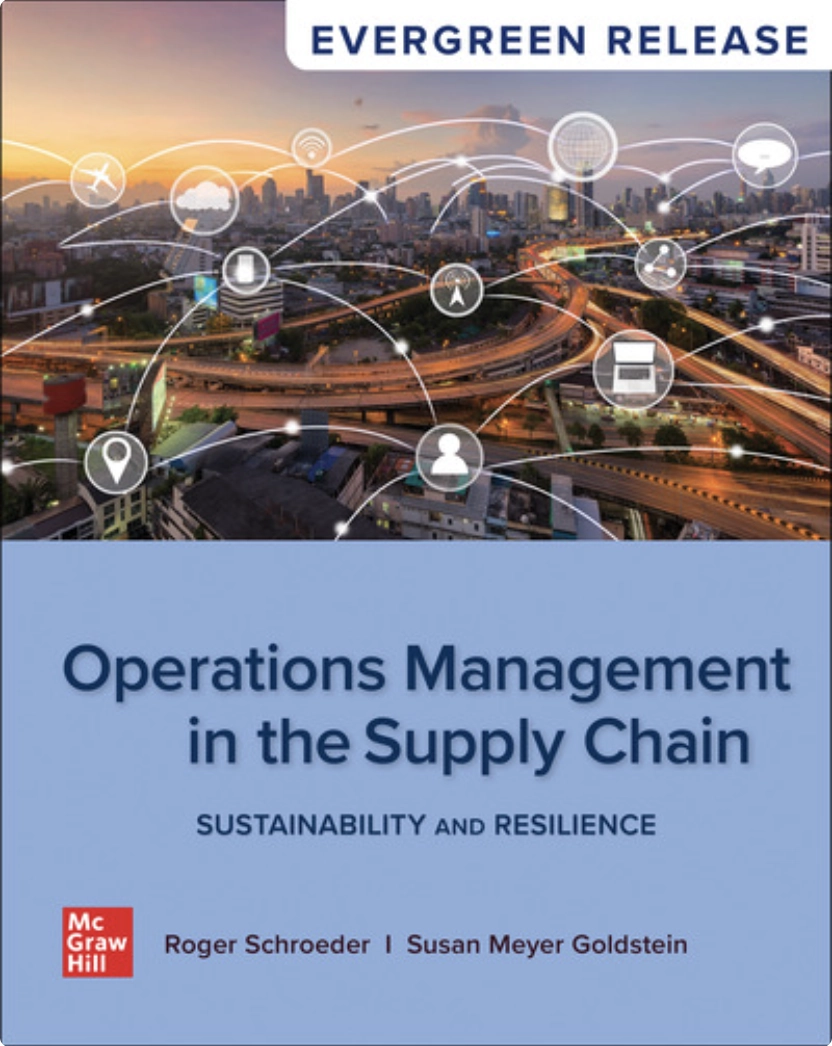Teaching Supply Chain Sustainability and Resilience
Supply chain sustainability and supply chain resilience are essential contemporary topics that should be taught to undergraduate and MBA students.
As authors of the textbook, Operations Management in the Supply Chain: Sustainability and Resilience, we believe that supply chain sustainability and supply chain resilience are essential contemporary topics that should be taught to undergraduate and MBA students. In our forthcoming revised 9th edition and 2024 release, both sustainability and resilience receive substantial coverage, including content, examples, and cases. With this new content, the text now has the best coverage of these topics across several chapters.
Sustainability
Sustainability is emerging as a central topic in transforming internal production of goods and services and associated supply chains as well. Because of its impact on the entire business, core courses in operations and supply chain management should take a central role in business schools by teaching how sustainability is defined, implemented, and managed in current and future supply chains. In a recent curriculum review at the Carlson School of Management, University of Minnesota, our core supply chain and operations course was designated to take the lead in teaching students about managing sustainability.
Sustainability includes environmental, social and economic viability – also called the 3P’s (planet, people and profit). Environmental sustainability includes changes in product development, sourcing, manufacturing, transportation, services and end-of-life management to protect the environment. Terminology such as the 3R’s (reduce, reuse and recycle) can be explained, along with Extended Producer Responsibility for new product design, and ESG (environmental, social, and corporate governance).
Social sustainability content includes protecting the well-being of people, hiring a diverse workforce, providing equal opportunities and safe and healthy working conditions. We have written a Starbucks case study that illustrates how sustainability plays out throughout its supply chain by certified Coffee and Farmer Equity (C.A.F.E.) practices. Starbucks sources high-quality coffee beans for roasting and delivery to its stores while protecting the environment and supporting social sustainability for farmers. Howard Schultz, the CEO of Starbucks, set the standard as a leader in sustainable environmental and ethical social practices because he believed it was a good business practice.
Economic sustainability ensures the firm’s long-term viability by maintaining a sustainable competitive advantage that serves the customer. This is done by developing and implementing an operations and supply chain strategy that is designed to achieve a competitive advantage. Some courses do not emphasize strategy and the critical role that operations can play in a competitive environment. We believe understanding the strategic role of operations and supply chain is essential for students in all business majors.
Resilience
Supply chain resilience is another contemporary topic of great importance, as firms face increasingly damaging effects from supply chain disruptions. Comprehensive coverage of supply chain resilience should be included in operations and supply chain courses. Supply chain risk includes any uncertainty that impacts the firm’s ability to produce and deliver its products or services. In addition to the recent global pandemic, a variety of natural and manmade events (e.g., product recalls, fires, tornadoes and hurricanes) have exposed the vulnerability of many supply chains. Supply chain designs must be updated to recognize risks, not only to pursue lowest costs.
To improve resilience and reduce risk, core courses should present material on supply chain mapping, analysis of supply chain risk, reducing risk where possible, and rapid planning and response to severe disruptions when they occur. Sourcing can diversify the supply chain in a variety of ways, including by nearshoring or finding multiple suppliers to reduce single supplier risk. Managers have not traditionally recognized risks inherent in a sole focus on seeking the lowest cost suppliers. Attention to proactively developing supply chain resilience needs to take a larger role in supply chain design and analysis.
Supply chain sustainability and supply chain resilience are important topics for today’s students who will develop into tomorrow’s business leaders. Teaching these topics in operations and supply chains courses is an important learning opportunity to prepare them for their future.
Roger G. Schroeder

 Roger G. Schroeder is the Frank A. Donaldson Chair Emeritus in Supply Chain and Operations Management at the Carlson School of Management, University of Minnesota. He received a Ph.D. from Northwestern University. He is among the most widely published and cited researchers in the field of operations management. He has been selected as a member of the University of Minnesota Academy of Distinguished Teachers and is a recipient of the Morse Award for outstanding teaching. Professor Schroeder received the Lifetime Achievement Award in operations management from the Academy of Management, and he is a Fellow of the Decision Sciences Institute and the Production and Operations Management Society
Roger G. Schroeder is the Frank A. Donaldson Chair Emeritus in Supply Chain and Operations Management at the Carlson School of Management, University of Minnesota. He received a Ph.D. from Northwestern University. He is among the most widely published and cited researchers in the field of operations management. He has been selected as a member of the University of Minnesota Academy of Distinguished Teachers and is a recipient of the Morse Award for outstanding teaching. Professor Schroeder received the Lifetime Achievement Award in operations management from the Academy of Management, and he is a Fellow of the Decision Sciences Institute and the Production and Operations Management Society
Susan Meyer Goldstein

Susan Meyer Goldstein is an Associate Professor in Supply Chain and Operations at the Carlson School of Management, University of Minnesota. She obtained a Ph.D. in operations management from Fisher College of Business at The Ohio State University. Her current research and teaching interests involve service process design and management, as well as operations strategy issues. She has received the Carlson School of Management Teaching Award and the Carlson School of Management Service Award, each multiple times.
Learn more about Operations Management in the Supply Chain: Decisions & Cases here.


